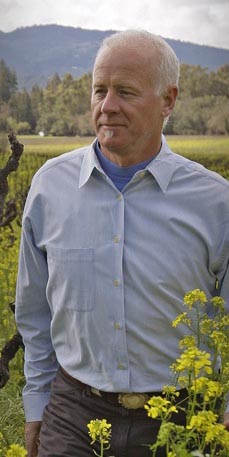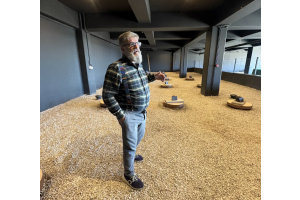
Bo Barrett was played by Chris Pine (who also played Captain Kirk in Star Trek) in Bottle Shock, the film about the 1976 Tasting of Paris. California wines were pitted against top French producers with the Americans coming out on top. Chateau Montelena, owned by Bo's father Jim won for the 1973 Chardonnay created by head winemaker Mike Grgich. Bo was part of the cellar team at the time.
Grape Collective: How did your family become involved with the wine business?
Bo Barrett: My father was a real estate development attorney in Los Angeles, my grandparents were Irish immigrants. He was an attorney and he was really good at it, but the job of an attorney is making people miserable, so he wanted to make people happy, so he looked at something to do as a second career. He caught the wine bug, somehow, being an Irish American. He didn’t grow up in wine at all, but he just got the bug and started Chateau Montelena in 72.
Grape Collective: How you do go from being a lawyer to all of a sudden starting a winery?
Bo Barrett: He was a team builder. He understood teams. He had a very large law firm, 35 attorneys, and talk about hurding cats. You’ve got 35 attorneys, that’s a lot of pain. So when he started a winery, everybody was focused on the same single goal to make great wine. It’s actually an easier transition to become a vintner, but he was a team builder. He was never a farmer, he was never a winemaker. He hired pros like me or John Rolleri, Mike Grgich to make the wine and to run his vineyard.
He was a philosopher king kind of guy, so that’s how he made the transition. He just put the team together and turned them loose ... Kind of like a football team owner.
Grape Collective: How did he get involved with the 1976 Tasting of Paris?
Bo Barrett: Again, you’ve got to go back into the time machine. There were people that really were making good wine here. Steven Spurrier and Pat Gallagher heard about it, so they came out and were scouting. Robert Balzer was a cheerleader for the LA Times of California Wine, so there’s a bubbling cauldron and all it needs is a catalyst.
So the Paris Tasting is the catalyst, but the bubbling cauldron, whether it’s us or Freemark Abbey or the other, Spring Mountain, the guys who are making good wines, Warren Winiarski, Joe Heitz, the historical Jedi of that time. We’re all making these good wines, and Spurrier, Pat Gallagher heard about it. They came over and really did their homework research, and they found us. It’s not like we volunteered. We were making good wine, they found us, they took it back.
Grape Collective: When you heard about the victory, what did everybody do?
Bo Barrett: Well, it was just a regular work day here. We’re in the cellar and this parking lot out here in front of the Chateau. And Mike Grgich, our winemaker, he crafted that wine, our boss, who is my dad’s winemaker. He’s Croatian. He’s dancing the jig out here, woo, woo, woo, hootin and yelling. We’re all the cellar guys, we just think Grgich has gone around the bend. “Ve von, ve von.” He’s waving the telegram from my dad, “Ve von, ve von,” and that’s how we heard about it, so then we were all hopping around, "Ve von, ve von.” That’s was pretty fun.
Grape Collective: Did you have any idea at the time how important that event was going to be?
Bo Barrett: No. The historical event that we knew was the catalyst shot heard around the world, no. We were getting pretty used to winning tastings by that time. There were some really good wines coming out of here, so we were getting used to winning tastings, in San Francisco, Los Angeles, maybe Chicago. Anyway, but in the historical respective that 40 years on we’re still talking about it, and it might be a bigger deal now; it was Go America Day. No, we didn’t realize how big it would be at that time.
Grape Collective: How did it impact everyone’s lives since then?
Bo Barrett: The Chardonnay was a cash-flow product to get us the Cabernet establish because the whole 100 acres here had to be replanted. We made Chardonnay with purchased fruit to fund the replant of the Cabernet and the buying barrels for the Cabernet and the bottles for the Cabernet, and the barrel aging of the Cabernet. So really the Chardonnay for us was really a cash-flow project that got out of hand, and 40 years later we’re still making it.
What happened to us is it allowed us to establish the Estate Cabernet. The sales of the Chardonnay was good enough to allow us to continue with our business plan, to establish state Cabernet vineyards, and to focus on the Cabernet that we have today. Our global reputation is really for the Cabernet. The Chardonnay has had a rebirth renaissance since the film and George Taber’s book, but by the time the 30th anniversary came around we were pretty much well known for the state Cabernet, so it allowed us to execute our business plan.
In the big picture, it elevated wine around the world. We think that the Australians said that, “Oh, if the Americans can do it, we can do it,” and the South Americans and Chileans, the South Africans especially. Quality of wine is not only the province of Europe, whether it’s Germany, Austria, or France especially, that good wine could be made wherever the weather is good enough and the people care enough.
Grape Collective: Tell us about the movie. You were played by Chris Pine in Bottle Shock, who is also Captain Kirk.
Bo Barrett: Yeah. I thought that was pretty cool, Captain Kirk. That was good, and Jack Ryan, all my heroes from when I was a young guy. When they said they were going to make the movie, it was after the book had come out, the 30th anniversary. They said they were going to make a film. We said, “Well, it’s at the library, the documentary’s been done.” They said, “No, no, we’re going to make a love story to California Napa Valley wine, and it’s going to be based around the story of Chateau Montelena.” I said, “Well, everybody knows what happens.” They said, “Yeah, well so did Miracle on Ice, they know what happens too.”
So they made the movie, and it’s been a really good thing for the California Napa Valley wine business, because then when people come they see how people care. They really want to make good wine and they really want to live with the land and all that good stuff that the movie expresses, that we care about it.
I think they followed through on their promise, so it’s really not a documentary of what happened, but it is a fanciful embellishment upon the spirit of the times and the creativity of the times. In that, I think it was accurate, but a lot of the stuff in the movie is not. The documentary is at the library.
Grape Collective: Tell us a little about how Napa has changed. You’ve been here since the early days. Land was $4000 an acre, and now it’s obviously one of the most expensive areas in the world for growing grapes. How has the culture changed in Napa?
Bo Barrett: It’s funny. The culture’s changed in Napa. The farmers though are still farmers. They’re still working the land. The ownership group has changed a little bit. There’s not as much family farmers - that's going away. Also the margins of farming at not as good because the farming is more expensive than it used to be, the land cost and the overhead.
The culture has stayed the same. It’s working with the land, so the money hasn’t changed it that much. The industry hasn’t changed that much, just the people with their homes and their mega-mansions, and the owners group has changed a little bit. It’s not just people like my family that just moved up here, gave up everything to make wine. These guys have money from other stuff.
One of the most interesting changes here, there’s people here who are here to spend money, not earn a living, and we’ve got to compete with the people who are here to spend money. They’re not here to earn a living and pay their people. They’re here to showoff and spend their money that they made elsewhere ... But, we can still whoop them because we’ve got our heart in the right place, and we’re willing to do the hard work.
You have to remember Chateau Montelena was built by a tycoon in 1886, so they probably ask the same questions to Jacob Schram in 1886, what do you think about that super-rich dude that often comes and is building Chateau Montelena. I think a lot of the fancy places that are being put in now, let’s give them 100 years and they’ll probably be doing good work.
Grape Collective: Last question. The wine critics have put themselves in two camps now. You have the Wine Spectator and the Wine Advocate who have been the proponent for these larger, high-alcohol wines coming out of Napa, and then there’s Jon Bonné and Eric Asimov, who are proponents for more of a more food friendly, low-alcohol type of wine. Do you have any opinion on the stylistic differences?
Bo Barrett: I do. One thing I think is it’s kind of like the Cold War. You’re either with the Soviet Union or you’re with the USA and NATO. What happen is as that broke down you have this global anarchy, and that’s what I see with the Internet has created this democracy where people are voting with their feet, and the freedom to choose their own wines and different styles of wines has never been better.
It’s really good to have the Internet because the Internet won the war, sure. In the printed press, there’s still a Cold War. They’re still the Wine Advocate and they’re still the Spectator, but in the real world where we live, the Internet is doing all the work and has people talking and it’s Jon Bonné and people listening to everything.
I think it’s as dynamic as the 70s. I’ve been doing it a long time now, as we’re kind of back to the 70s, the pre-Wine Spectator days, the pre-Wine Advocate days where it’s people talking to people. I think that’s why I like the Grape Collective project so much is because it’ll get people talking, and they’ll say, “Hey, I saw these guys on the Internet, I bought a bottle of wine. What do you think? Oh, you know, it’s great, it sucks," and people talk.
Basically, I think we’re circling back to quality and then price second to quality, and not the showiness, not the bigness, and not the people that are tasting hundreds of wines a day. Because when you’re tasting hundreds of wines a day, you get into fatigue, and that’s why they like the sweetness, the high alcohol, low acid. In a fatigue environment, those wines are better.
At your dinner table, the high acid, refreshing, cool flavors, vineyard flavor is going to dominant, so it’s just a different world. I think what’s happening is the Internet and the people talking are talking about wine in the context where it should be judged ... Not in a roomful of wines, a thousand wines where the room already smells like Cabernet. It’s at your dinner table, at your back patio, and that’s what I think is what I see is the Internet has brought us a delightful, lovely anarchy.
Buy Chateau Montelena wines directly from the winery.














